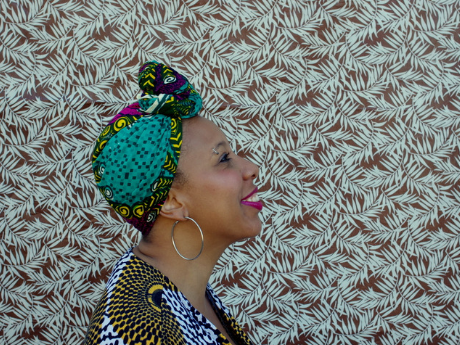In Their Own Words
Morgan Parker's “Apology with Pearls On”

Apology with Pearls On
Is it enough that I am in bed
with Digable Planets, silk pajamas?
Was going to say "shitty," got
auto-corrected. Took back
"leopard print," inserted
houndstooth. I am moving
on up, getting dee-luxed.
Cleaning the house without
your tongue. Not rolling
in my six-four toward
anywhere. Green hills, wild blue
what you're thinking
I can also think. If I want I can
cross my legs, or hush.
Make darling less sharp.
I whittle down to lace
stockings, get laser-removed.
Skip dollar Bud Thursday to slink
along the Chelsea circuit white-wined.
I'll take this one: graceful gold-tipped point
to culture no pop all fizzle. To canvas,
a savings account with truffles.
Think eggshell white, stainless
gums clenched. Uptightening
in sonatas I call home. Finally
planting basil, patient to save you
a sprig. Improved, I ask
instead of take.
From Other People's Comfort Keeps Me Up At Night (Switchback Books, 2015). All rights reserved. Reprinted with the permission of the author.
Introduction by Christopher Soto
Morgan Parker's debut collection of poems, Other People's Comfort Keeps Me Up At Night, is filled with sass, wit, confidence. The narrator of these poems refuses to be overly poetic, says what's on her mind, and always has blunt, keen observations to share. "I wish I could say that luxury / didn't matter. But privilege / feels damn good." The narrator of these poems has me laughing and snapping and yearning for more. Other People's Comfort Keeps Me Up At Night is a phenomenal debut, for its range of cultural and intellectual reference, and its expansive voice.
Morgan Parker on "Apology with Pearls On"
This poem started when a friend challenged me to write something "elegant." On G-chat, I followed his suggestion with a "lol." Elegance is something my poems never aspire to. I write about disappointing one night stands, peeing on street corners at night, getting too drunk to hide how I feel. As a woman, I almost cringe at the idea of being elegant, weary from men on the street telling me to smile and averse to anything that insists I "behave" or be "lady-like." As a Black American, I have so much painful history around being shushed, and not being seen, and following expectations to stay in line. At the same time, the idea of elegance is extremely romantic to me, though triggering.
But what does elegance mean and look like to me? What are its possibilities? So much of my writing is about challenging definitions—of femininity, of Blackness, of humanity, of emotion. As I was writing this—sitting in bed in my silk leopard PJs and listening to Digable Planets' Reachin' (A New Refutation of Time and Space)—I was actively exploring how to undercut and buck traditional definitions of elegance and define it for myself. What makes the poem so active for me is that it is as much about redefinition as it is sarcastically about the impulse to shrink away from being contained. To explore the complexity around "improvement."
The thing about improvement, or elegance, is that its standards are exterior, often societal. I included language from some of these outside voices in the poem—well-known phrases, lyrics, vernacular speech—to point out the fact that our identities and self-assertions are always social, always cultural. By definition, "improvement" honors a pre-determined standard and eliminates the possibility of self-actualization as an individual act. There is no such thing as "pure" self-identification—especially for those who are systematically and historically marginalized, like Black women. Before we can forge our own identities, we must break down and disengage from the rules and stereotypes assigned us at birth. Actualization is, first, always an act of negation: who I am is what I say I am, and also what I say I am not.


